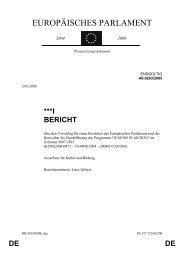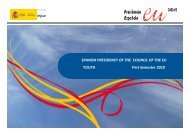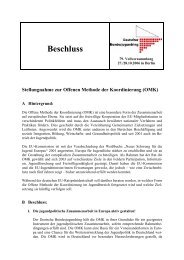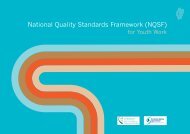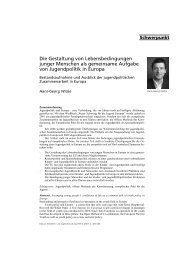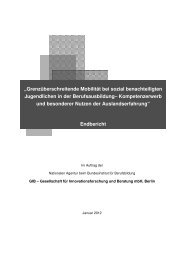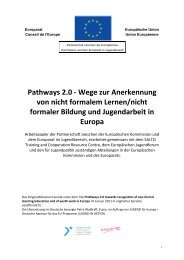Report - Salto
Report - Salto
Report - Salto
You also want an ePaper? Increase the reach of your titles
YUMPU automatically turns print PDFs into web optimized ePapers that Google loves.
Bridges for Recognition | Terms and Concepts - What do we mean when we say…<br />
47<br />
People involved<br />
Learning providers are organisations or a set of institutionalised arrangements that deliver<br />
learning, that is, that manage and monitor the provision of courses of some kind, whether<br />
formal or non-formal. Learning providers may also design and/or execute the courses they<br />
offer, and they may operate in either the public or the private sector. They may or may not be<br />
subject to some form of state or professional regulation to assure quality and standards.<br />
Learning facilitator is a new term that aims to establish an inclusive word for all those who<br />
shape, guide and accompany the learning process, regardless of the sector in which they work<br />
and the kind of learning involved.<br />
Trainer is the word traditionally used to refer to those who shape, guide and accompany<br />
learning processes in the initial and continuing vocational education and training sectors. They<br />
most typically work in vocational schools and colleges, both public and private, in companyrun<br />
training units or at the workplace itself. They may also staff vocational tracks or subjects in<br />
general education institutions, and they could work in ‘second chance’-type projects that aim to<br />
integrate disadvantaged or unemployed young people or (older) adults into the labour market.<br />
Teacher is the word traditionally used to refer to those who shape, guide and accompany<br />
learning processes in schools, colleges and – to some extent – higher education. They may<br />
teach vocational subjects, but it is not common to use the word ‘teacher’ for those who work in<br />
company-based contexts.<br />
Tutor is a term that is sometimes used as a synonym for teacher, but generally it connotes<br />
someone whose pastoral role (looking after someone’s overall personal well-being) is at least<br />
as important as a purely teaching/training role.<br />
Mentoring is a structured process for providing personal guidance and support to someone<br />
who is younger, less experienced or new to the game – whatever the context may be, but most<br />
commonly in education, training and employment contexts. Mentors act as critical but nonjudgemental<br />
friends, provide a role model and a source of useful information and advice, and<br />
can take on a coaching task (helping to improve performance). They may be freely chosen,<br />
but may also be allocated using a set of matching criteria. Formal mentoring programmes are<br />
likely to specify a given time-period for the mentoring relationship.




